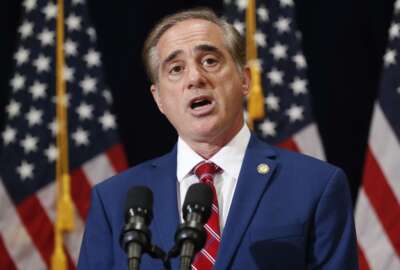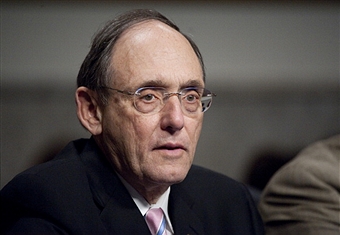
Senate silent on a federal pay raise, and other bills to watch
The Senate stays silent on a pay raise for federal employees in its 2018 appropriations bill, meaning civilian workers are closer to a 1.9 percent boost next year.
Editor’s Note: Unless Congress passes a budget or continuing resolution by the end of Dec. 8, the government will shut down Dec. 9., at 12:01 a.m.
Subscribe to Federal Drive’s daily audio interviews on iTunes or PodcastOne.
Congress remains quiet on a pay raise for federal employees in fiscal 2018, meaning the president’s total average pay bump of 1.9 percent is getting closer to reality.
The Senate Appropriations Financial Services and General Government Subcommittee released its final version of the 2018 appropriations bill last week. The legislation does not offer an alternative to the White House’s proposal, which President Donald Trump announced at the end of August.
Trump set an average base raise of 1.4 percent, with an additional 0.5 percent adjusted for locality pay, for a total of 1.9 percent.
Congress can ultimately propose an alternative that differs from the president’s suggestion, but the House has also been silent on a pay raise for civilian federal employees.
It’s unlikely that Congress will settle the differences between the House and Senate versions and pass all appropriations bills for the fiscal year, much less before the current continuing resolution expires Dec. 8.
“The Senate Appropriations Committee has little time to finalize the regular appropriations bills and to consider additional supplemental appropriations requests for defense and for natural disaster recovery,” Chairman Thad Cochran (R-Miss.) said in a Nov. 16 statement. “We need a new budget deal to finish our work. Congress and the administration must reach agreement on acceptable top line funding levels for defense and non-defense programs.”
But with the Senate subcommittee’s 2018 appropriations bill, Congress still seems poised to accept the president’s pay proposal.
The Senate subcommittee funds civilian agencies at $637 million below the previous year. The IRS would see a $124 million funding cut in fiscal 2018.
Like the House version, the Senate bill includes none of the $790 million the General Services Administration requested for federal construction. The Federal Buildings Fund would also see $1 billion cut compared to the previous year.
Under the Senate version, the Office of Personnel Management could receive $1.8 million more than the previous fiscal year, but the legislation includes $21 million for the agency’s IT modernization efforts — about $16 million below OPM’s request of $37 million.
Beyond these appropriations bills, here are other pieces of legislation worth watching when Congress returns to Capitol Hill next week.
VA ‘BRAC’
Efforts to quickly pass legislation that would force the Veterans Affairs Department to take a holistic look at its bloated inventory of outdated, underused and vacant buildings hit a snag last week.
The House Rules Committee was scheduled to review the VA Asset and Infrastructure Review (AIR) Act last Tuesday, but lawmakers took the hearing off the agenda.
Though Democrats on the House Veterans Affairs Committee criticized the push to move forward on asset review before finding a compromise on the future of the VA Choice Program, their dissent isn’t the reason for the holdup.
Instead, a little-known law Congress passed last year is giving veterans groups and lawmakers their latest headache.
The House already passed the Federal Assets Sale and Transfer Act last year, which establishes a governmentwide Public Buildings Reform board to review agencies’ vacant, underused or outdated facilities.
Under the asset sale act, the board is supposed to make recommendations to the Office of Management and Budget, which will eventually develop a governmentwide plan to dispose, sell or transfer unneeded federal property.
But the VA “AIR” bill conflicts with the premise of the Federal Assets Sale and Transfer Act, which already authorized a governmentwide review of federal property.
The VA legislation would establish a nine-member Asset and Infrastructure Review Commission to review the department’s current medical facilities. The president would work with veterans service organizations to staff the commission, and the Senate would confirm all appointees.
It gives VA five years to gather its own market research and work with the presidentially-appointed commission to study the department’s assets. It would have five years to develop a series of recommendations to submit for the president’s review and Congress’ consideration.
The bill had changed considerably throughout the legislative process, and House Veterans Affairs Committee Chairman Phil Roe (R-Tenn.) led several meetings with veterans organizations to discuss and make changes to the bill.
The VA committee is working with the House Transportation and Infrastructure Committee, which originally sponsored the Federal Assets Sale and Transfer Act last year. Roe specifically is working with members to find a solution and a path forward for the VA bill, a committee spokeswoman said.
The VA AIR Act also includes $2.1 billion in additional funds for the Choice Program, which Roe said would give both Congress and the department time to finish negotiations on a new community care program.
In addition, the VA bill would also eliminate existing caps on employee bonuses and performance awards. The Veterans Access, Choice and Accountability Act of 2014, which hastily stood up the Choice program and introduced new “accountability” measures for VA employees and senior executives, put limits on bonuses and awards three years ago.
Bills on the move
The House will move next week on the Ensuring a Qualified Civil Service (EQUALS) Act, which extend the probationary period for most federal employees from one to two years. The Rules Committee is scheduled to review the bill next Wednesday.
Member organizations of the Government Managers Coalition have backed the bill, arguing the legislation would give new employees more time to complete specialized training and supervisors more time to evaluate their performance.
Meanwhile, the House last week passed the Foundations for Evidence-Based Policymaking Act, the House Speaker-sponsored bill that would authorize the creation of a new member to the C-suite: a chief evaluation officer. The legislation would put many of the recommendations from the Commission on Evidence-Based Policymaking in law.
The Senate Homeland Security and Governmental Affairs Committee has yet to mark up the bill.
Copyright © 2024 Federal News Network. All rights reserved. This website is not intended for users located within the European Economic Area.
Nicole Ogrysko is a reporter for Federal News Network focusing on the federal workforce and federal pay and benefits.
Follow @nogryskoWFED
Related Stories

Funding for a new veterans choice program remains the big, unresolved question for VA





